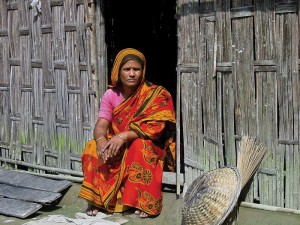Women Going Without

OK, so you know the global food crisis is affecting millions. But did you know that the crisis affects women even more than men?
That’s the subject of a recent brief by the International Food Policy Research Institute (IFPRI), Helping Women Respond to the Global Food Price Crisis. According to IFPRI,
Higher food prices increase the burden for women, who must stretch the limited food budget even further. Women often end up being the shock absorbers of household food security, reducing their own consumption to leave more food for other household members. In Bangladesh, even before the crisis, almost 60 percent of households reported that women skip meals more often than men.
As food prices rise and staples consume more of the food expenditures, households frequently cut back on both food quantity (caloric intake) and quality (dietary diversity), which provides micronutrients that girls and women particularly need…
And, if women lack proper nutrition, even a short-term crisis can have effects that will cast a long shadow:
Pregnant and lactating mothers are among the groups considered most at risk of food insecurity and poor nutrition induced by crisis, with implications for their health and nutritional status and the future health and productivity of their children.
Reading this, I can’t help but think of three of my friends and colleagues, all of whom happen to be pregnant at the same time. These moms-to-be have options at hand to get all the nutritious food they need, plus satisfy their random cravings… but what if those options didn’t exist?
At a time when women in the US are fighting their own battles for economic opportunity, it’s troubling to think of more women in the developing world being forced to go without. But IFPRI researchers also see women as the key to the solution: A global investment in women, they say–particularly women farmers–can help increase incomes and bring an end to the crisis.